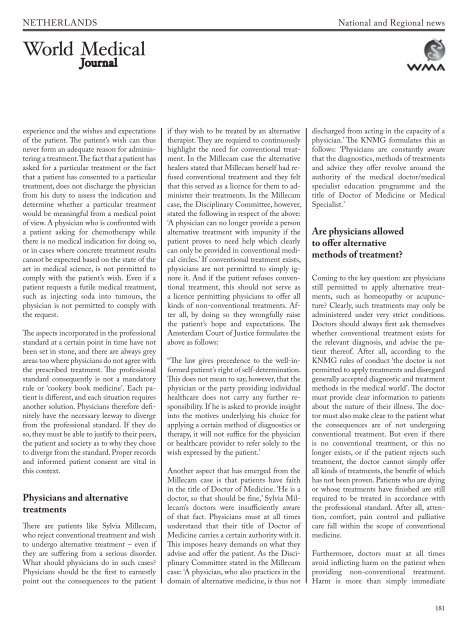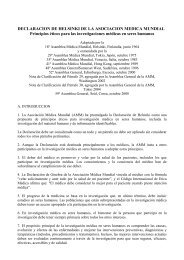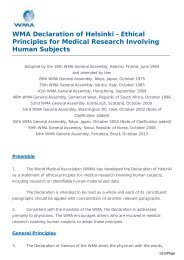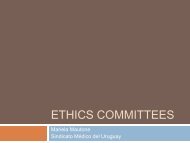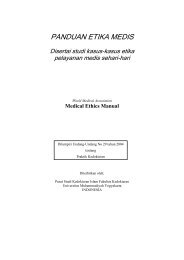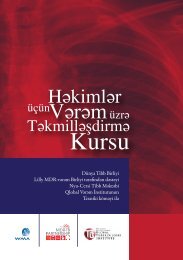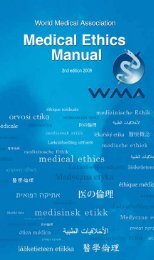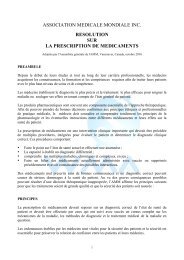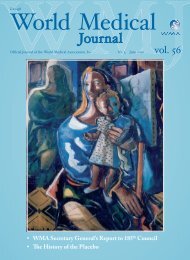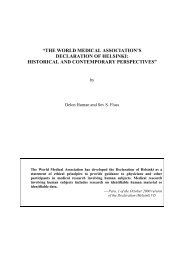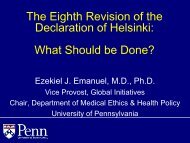WMJ 05 2011 - World Medical Association
WMJ 05 2011 - World Medical Association
WMJ 05 2011 - World Medical Association
You also want an ePaper? Increase the reach of your titles
YUMPU automatically turns print PDFs into web optimized ePapers that Google loves.
NETHERLANDS<br />
National and Regional news<br />
experience and the wishes and expectations<br />
of the patient. The patient’s wish can thus<br />
never form an adequate reason for administering<br />
a treatment. The fact that a patient has<br />
asked for a particular treatment or the fact<br />
that a patient has consented to a particular<br />
treatment, does not discharge the physician<br />
from his duty to assess the indication and<br />
determine whether a particular treatment<br />
would be meaningful from a medical point<br />
of view. A physician who is confronted with<br />
a patient asking for chemotherapy while<br />
there is no medical indication for doing so,<br />
or in cases where concrete treatment results<br />
cannot be expected based on the state of the<br />
art in medical science, is not permitted to<br />
comply with the patient’s wish. Even if a<br />
patient requests a futile medical treatment,<br />
such as injecting soda into tumours, the<br />
physician is not permitted to comply with<br />
the request.<br />
The aspects incorporated in the professional<br />
standard at a certain point in time have not<br />
been set in stone, and there are always grey<br />
areas too where physicians do not agree with<br />
the prescribed treatment. The professional<br />
standard consequently is not a mandatory<br />
rule or ‘cookery book medicine’. Each patient<br />
is different, and each situation requires<br />
another solution. Physicians therefore definitely<br />
have the necessary leeway to diverge<br />
from the professional standard. If they do<br />
so, they must be able to justify to their peers,<br />
the patient and society as to why they chose<br />
to diverge from the standard. Proper records<br />
and informed patient consent are vital in<br />
this context.<br />
Physicians and alternative<br />
treatments<br />
There are patients like Sylvia Millecam,<br />
who reject conventional treatment and wish<br />
to undergo alternative treatment – even if<br />
they are suffering from a serious disorder.<br />
What should physicians do in such cases<br />
Physicians should be the first to earnestly<br />
point out the consequences to the patient<br />
if they wish to be treated by an alternative<br />
therapist. They are required to continuously<br />
highlight the need for conventional treatment.<br />
In the Millecam case the alternative<br />
healers stated that Millecam herself had refused<br />
conventional treatment and they felt<br />
that this served as a licence for them to administer<br />
their treatments. In the Millecam<br />
case, the Disciplinary Committee, however,<br />
stated the following in respect of the above:<br />
‘A physician can no longer provide a person<br />
alternative treatment with impunity if the<br />
patient proves to need help which clearly<br />
can only be provided in conventional medical<br />
circles.’ If conventional treatment exists,<br />
physicians are not permitted to simply ignore<br />
it. And if the patient refuses conventional<br />
treatment, this should not serve as<br />
a licence permitting physicians to offer all<br />
kinds of non-conventional treatments. After<br />
all, by doing so they wrongfully raise<br />
the patient’s hope and expectations. The<br />
Amsterdam Court of Justice formulates the<br />
above as follows:<br />
“The law gives precedence to the well-informed<br />
patient’s right of self-determination.<br />
This does not mean to say, however, that the<br />
physician or the party providing individual<br />
healthcare does not carry any further responsibility.<br />
If he is asked to provide insight<br />
into the motives underlying his choice for<br />
applying a certain method of diagnostics or<br />
therapy, it will not suffice for the physician<br />
or healthcare provider to refer solely to the<br />
wish expressed by the patient.’<br />
Another aspect that has emerged from the<br />
Millecam case is that patients have faith<br />
in the title of Doctor of Medicine. ‘He is a<br />
doctor, so that should be fine,’ Sylvia Millecam’s<br />
doctors were insufficiently aware<br />
of that fact. Physicians must at all times<br />
understand that their title of Doctor of<br />
Medicine carries a certain authority with it.<br />
This imposes heavy demands on what they<br />
advise and offer the patient. As the Disciplinary<br />
Committee stated in the Millecam<br />
case: ‘A physician, who also practices in the<br />
domain of alternative medicine, is thus not<br />
discharged from acting in the capacity of a<br />
physician.’ The KNMG formulates this as<br />
follows: ‘Physicians are constantly aware<br />
that the diagnostics, methods of treatments<br />
and advice they offer revolve around the<br />
authority of the medical doctor/medical<br />
specialist education programme and the<br />
title of Doctor of Medicine or <strong>Medical</strong><br />
Specialist.’<br />
Are physicians allowed<br />
to offer alternative<br />
methods of treatment<br />
Coming to the key question: are physicians<br />
still permitted to apply alternative treatments,<br />
such as homeopathy or acupuncture<br />
Clearly, such treatments may only be<br />
administered under very strict conditions.<br />
Doctors should always first ask themselves<br />
whether conventional treatment exists for<br />
the relevant diagnosis, and advise the patient<br />
thereof. After all, according to the<br />
KNMG rules of conduct ‘the doctor is not<br />
permitted to apply treatments and disregard<br />
generally accepted diagnostic and treatment<br />
methods in the medical world’. The doctor<br />
must provide clear information to patients<br />
about the nature of their illness. The doctor<br />
must also make clear to the patient what<br />
the consequences are of not undergoing<br />
conventional treatment. But even if there<br />
is no conventional treatment, or this no<br />
longer exists, or if the patient rejects such<br />
treatment, the doctor cannot simply offer<br />
all kinds of treatments, the benefit of which<br />
has not been proven. Patients who are dying<br />
or whose treatments have finished are still<br />
required to be treated in accordance with<br />
the professional standard. After all, attention,<br />
comfort, pain control and palliative<br />
care fall within the scope of conventional<br />
medicine.<br />
Furthermore, doctors must at all times<br />
avoid inflicting harm on the patient when<br />
providing non-conventional treatment.<br />
Harm is more than simply immediate<br />
181


